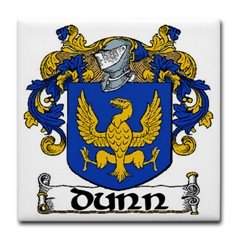 Michael Dunn and Bridget Grace are each recorded as being born in Ireland around 1830-35, were married in the village of Glossop in County Derbyshire, England, in 1853, emigrated to the U.S. in 1858 and became the great grandparents of WIlliam Edward (Bill) Dunn. Their stories are covered elsewhere in this blog and the following is a "snapshot" of the origin and history of the surname Grace.
Michael Dunn and Bridget Grace are each recorded as being born in Ireland around 1830-35, were married in the village of Glossop in County Derbyshire, England, in 1853, emigrated to the U.S. in 1858 and became the great grandparents of WIlliam Edward (Bill) Dunn. Their stories are covered elsewhere in this blog and the following is a "snapshot" of the origin and history of the surname Grace."This interesting name has two possible origins, both dating from the early medieval period in England. The first is from a nickname, from the Middle English and Old French word "grace", charm, pleasantness, from the Latin "gratia". The second origin is from the female given name "Grace", which was popular during the Middle Ages, and is thought to derive in the first instance from the Old German "grisja", Old French "gris", grey, which is found in Middle English as "grece, greyce". However, the name was soon associated with the adjective "grace" as used in the nickname for a charming, pleasant person.
The personal name is first recorded in England in Suffolk in 1188, as "Grecie", and is listed as "Gracia" in 1213 (Surrey). The surname development includes Gilbert Gracye (1296, Sussex) and Adam Grace (1302, Suffolk). One George Grace was an early emigrant to the American colonies, leaving London on the "Globe" in August 1635, bound for Virginia. The first recorded spelling of the family name is shown to be that of Henry Grece, which was dated 1275, in the "Northamtonshire Hundred Rolls", during the reign of King Edward 1, known as "The Hammer of the Scots", 1272 - 1307.
Surnames became necessary when governments introduced personal taxation. In England this was known as Poll Tax. Throughout the centuries, surnames in every country have continued to 'develop' often leading to astonishing variants of the original spelling." Source
♦♦♦
Another source said, “I have found up to 20 different possible origins for the surname GRACE. The majority of GRACEs in the world today, of Irish origin (Kilkenny), are associated with (direct descendants or tenant farmers of the lands of) Norman lord William le Gros.”
♦♦♦
Yet another source said, "This surname is certainly derived from the French word gros, meaning large. McLysaght’s heart ruled his head when he derived the Irish Graces from the famous Raymond le Gros, one of the first invaders of Ireland in the 1160s. In fact they descend from William le Gras of Chipping Sodbury in Gloucestershire, several of whose sons came to Leinster in the train of William Marshall I in the early thirteenth century and obtained lands in Kilkenny, Carlow and Laois from him. William was a Norman aristocrat with a pedigree traceable back to eleventh century France. Today the name is principally found in Kilkenny and Dublin. Source
Last updated 4/2/2010

No comments:
Post a Comment